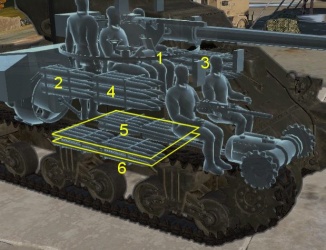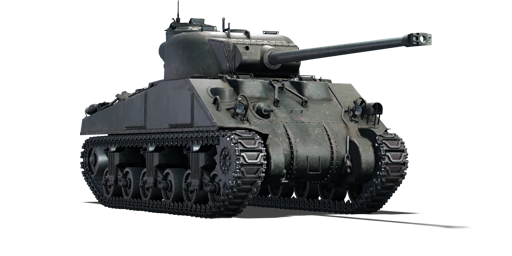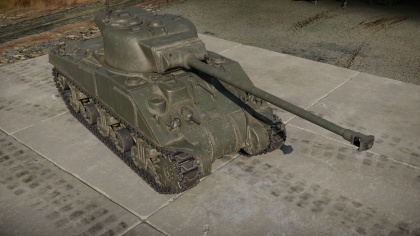Difference between revisions of "M4A4 (SA50)"
(→Mobility: Updated to new mobility template) |
(→Mobility: Corrected) |
||
| Line 58: | Line 58: | ||
<!-- ''Write about the mobility of the ground vehicle. Estimate the specific power and manoeuvrability, as well as the maximum speed forwards and backwards.'' --> | <!-- ''Write about the mobility of the ground vehicle. Estimate the specific power and manoeuvrability, as well as the maximum speed forwards and backwards.'' --> | ||
| − | {{tankMobility|abMinHp= 713|rbMinHp= | + | {{tankMobility|abMinHp= 713|rbMinHp= 407}} |
== Armaments == | == Armaments == | ||
Revision as of 18:48, 23 April 2020
Contents
| This page is about the French medium tank M4A4 (SA50). For other uses, see M4 (Disambiguation). |
Description
The M4A4 (SA50) is a Rank French medium tank
with a battle rating of (AB), (RB), and (SB). It was introduced in Update 1.75 "La Résistance". This tank is the equivalent to the British Sherman Firefly, it trades of its top-mounted HMG and additional armour for a better main gun: the SA50 L/57 cannon, which is the same gun as the AMX-13, providing an interesting perspective to what's coming next in terms of firepower. That being said, the rest of this tank is 100% Sherman, with all its good and bad. As of Update 1.77, it is one of two vehicles based on the M4A4 Sherman, the other being the Sherman VC Firefly.
As with any Sherman design, this tank is quite iconic of this vehicle's family: tall profile, sloped frontal armour, front-mounted transmission, plane radial engine power station, rounded turret with complex gun mantlet, it has got it all. the only difference from purely American Sherman is its long gun featuring a muzzle-break.
Firepower:
The Sherman's turret was not made for such a huge gun. this is why this tank has an elongated mantlet: to provide space for the long SA50 L/57 cannon. Originally, this tank was provided with a vertical stabiliser but it was disabled with this new gun mount as the strain was too great for this piece. Thus, unlike most Sherman, the French M4A4 SA50 does not have a stabilized gun, but what a gun it is ! This main armament performs a bit better than its British counter part, the QF 17-pounder as it has superior penetration rates at all ranges. With such a gun, sniping is an easy task as only early Panthers will be able to defeat it (they still have weak spots, thought).
With such firepower, there is also concerns: as said above, this gun is not stabilized, which makes target acquisition quite slow. This specific Sherman's main weakness being its lack of top-mounted MG, leaving it mostly vulnerable to strafing planes.
Armour:
With its sloped frontal armour, many low calibre shells will just bounce off the Sherman, any actual antitank gun you will face at this BR will easily go through this relatively thin armour at average combat ranges. Keep in mind not to linger too long is front of SPAAs as there is two very convenient flat plates in front of the driver and machine gunner. As for the turret, some angles may deflect shots but don't count on it. side and rear armour are vulnerable to anything bigger than HMG rounds since they are only 38 mm thick. In sum, this armour is there to provide occasional protection from poorly aimed shots and auto-cannon fire, but nothing more.
Mobility:
The Sherman chassis, with all its good and bad takes this tank around the battlefield. It will carry its user wherever it likes but it takes some time to do so. Don't count on it for hasty retreats as both reverse speed and hull turning are slow when this tank is stopped. As long as it is not required to do back-flips and drifting, this chassis does the job.
General info
Survivability and armour
Armour type:
- Rolled homogeneous armour
- Cast homogeneous armour (Transmission housing, Turret)
| Armour | Front (Slope angle) | Sides | Rear | Roof |
|---|---|---|---|---|
| Hull | 50.8 mm (56°) Front glacis 50.8 mm (0-64°) Transmission housing 50.8 mm (3-19°) Driver’s hoods |
38.1 mm | 38.1 mm (21°) Top 38.1 mm Bottom |
25.4 mm 19.5 mm Borders |
| Turret | 76 mm (7-65°) Turret front 63-100 mm (0-62°) Gun mantlet 51 mm (0-80°) Protruding gun mantlet |
51 mm (0-68°) | 51 mm (3-68°) | 25.4 mm |
| Armour | Sides | Roof | ||
| Cupola | 63.5 mm | 25.4 mm |
Notes:
- Suspension wheels are 15 mm thick, bogies are 10 mm thick, tracks are 20 mm thick.
- Patches on the side hull are added armour of 25.4 mm thickness.
Mobility
| Game Mode | Max Speed (km/h) | Weight (tons) | Engine power (horsepower) | Power-to-weight ratio (hp/ton) | |||
|---|---|---|---|---|---|---|---|
| Forward | Reverse | Stock | Upgraded | Stock | Upgraded | ||
| Arcade | Expression error: Unexpected * operator. | 713 | Expression error: Unexpected round operator. | __.__ | |||
| Realistic | 407 | Expression error: Unexpected round operator. | __.__ | ||||
Armaments
Main armament
| 75 mm SA50 L/57 | |||||
|---|---|---|---|---|---|
| Capacity | Vertical guidance |
Horizontal guidance |
Stabilizer | ||
| 62 | -10°/+25° | ±180° | N/A | ||
| Turret rotation speed (°/s) | |||||
| Mode | Stock | Upgraded | Prior + Full crew | Prior + Expert qualif. | Prior + Ace qualif. |
| Arcade | 22.85 | 31.62 | 38.4 | 42.48 | 45.18 |
| Realistic | 14.28 | 16.80 | 20.4 | 22.60 | 24.00 |
| Reloading rate (seconds) | |||||
| Stock | Prior + Full crew | Prior + Expert qualif. | Prior + Ace qualif. | ||
| 9.75 | 8.62 | 7.95 | 7.5 | ||
Ammunition
| Penetration statistics | |||||||
|---|---|---|---|---|---|---|---|
| Ammunition | Type of warhead |
Penetration in mm @ 0° Angle of Attack | |||||
| 10m | 100m | 500m | 1000m | 1500m | 2000m | ||
| POT-51A | APC | 181 | 178 | 161 | 143 | 127 | 112 |
| 75 mm HE | HE | 10 | 10 | 10 | 10 | 10 | 10 |
| PCOT-51P | APCBC | 201 | 198 | 179 | 159 | 141 | 125 |
| Shell details | ||||||||||
|---|---|---|---|---|---|---|---|---|---|---|
| Ammunition | Type of warhead |
Velocity in m/s |
Projectile Mass in kg |
Fuse delay
in m: |
Fuse sensitivity
in mm: |
Explosive Mass in g (TNT equivalent): |
Normalization At 30° from horizontal: |
Ricochet: | ||
| 0% | 50% | 100% | ||||||||
| POT-51A | APC | 1,000 | 6.4 | N/A | N/A | N/A | ° | 48° | 63° | 71° |
| 75mm HE | HE | 753 | 6.2 | 0.4 | 0.1 | 675 | +0° | 79° | 80° | 81° |
| PCOT-51P | APCBC | 1,000 | 6.4 | N/A | N/A | N/A | ° | 48° | 63° | 71° |
Ammo racks

| Full ammo |
1st rack empty |
2nd rack empty |
3rd rack empty |
4th rack empty |
5th rack empty |
6th rack empty |
7th rack empty |
8th rack empty |
Visual discrepancy |
|---|---|---|---|---|---|---|---|---|---|
| 62 | 57 (+5) | 51 (+11) | 42 (+20) | 33 (+29) | 13 (+49) | 9 (+53) | 5 (+57) | 1 (+63) | No |
Upper Hull Empty: 33 (+29)
Machine guns
| 7.62 mm M1919A4 | ||||||
|---|---|---|---|---|---|---|
| Coaxial mount | ||||||
| Capacity (Belt capacity) | Fire rate (shots/minute) |
Vertical guidance |
Horizontal guidance | |||
| 3,000 (250) | 500 | N/A | N/A | |||
Usage in battles
Experienced Sherman commanders will like this tank as it drastically increases this old boy's lethality. This tank is a very good representative of the medium tanks line, with average mobility, sufficient armour and enjoyable firepower. Get into position, manage to avoid shots doing so and ensure any role an average tank could do: sniper, brawler, flanker, etc.
With good overall characteristics, this vehicle can play many roles on the battlefield, here is some of them:
Brawler:
This tank has bad armour for the BR and you assume it. Using its good turret turning speed and close-quarter penetration rates, it should blast through almost anything it looks at. This tactic is very efficient in urban combat, where long range precision shots are not required, only reaction time and situation awareness can save you. Make sure to surprise your enemies while avoiding being targeted yourself can grant you with a few points. The most important thing about this tactic is to know when to pull off, as enemies will be aware of a rampaging Sherman in the area and will take advantage of it as soon as they got the opportunity. This is a high risk/high stakes game-play.
Sniper:
To be used in open maps, preferably against lower BR vehicles. Keeping a good distance from your enemie's gun, use your own cannon to penetrate them from any range. Even if your armour is not the best, it should block most incoming round, which have lost most of their energy from traveling for so long. Make sure to reposition every 2-3 shots as you may get spotted by a big gun. This tactic is even more effective when hulled-down: this tank has -10° of depression, make good use of them.
Use your imagination: any tactic that do not rely too much on armour is a good one when using this tank. Want to follow the team? No problem. Want to find a good ambush spot? Go for it.
Pros and cons
Pros:
- Good penetrating 75 mm gun, even better than the famous British QF 17-pounder
- -10 degrees of gun depression.
- Better penetration and armour than the Sherman Firefly.
- Sherman chassis, familiar to almost any tech tree.
- Overall a good tank.
- Clearly improves in all fields over the precedent French Sherman.
Cons:
- Not really good armour.
- Lacks a 50 cal when compared to other Shermans.
- Slower reload compared to the Sherman Firefly.
- No smoke rounds.
- Hull turning rate is bad.
- Slow reverse speed.
History
Israeli M4 Shermans
During the Cold War, the Israelis received stocks of M4 Sherman tanks to equip their armoured force. They were obtained from the British, French, and scrap yards across Europe.[1] Their designations on the Shermans were based on their armaments, leading to names such as the Sherman M-1 with the 76 mm M1 gun, the Sherman M-3 with the 75 mm M3 gun, and the Sherman M-4 with the 105 mm M4 howitzer, regardless of Sherman hull and engine model types. Sherman tanks equipped with the horizontal volute suspension system (HVSS) were given the added name "Super" in the designation.[2]
The M4 Shermans were seen as adequate in the early 1950s conflicts, but the Soviet arms trade with the neighboring Arab countries in the 1950s caused the Israelis to focus on uparming their existing Sherman inventory. Their program was a 1954 joint venture with France to arm the Sherman with the 75 mm SA50 gun from the AMX-13 light tank. The modifications to hold the 75 mm SA50 gun required the extension of the Sherman turret front and rear to make room for the gun and add a counterweight for the heavier front weight. With the success of this modification, the Israelis chose the 75 mm SA50 gun to be the new armament for the M4 Sherman inventory. The first fifty tanks with the 75 mm SA50 guns were added into a M4A4 Sherman hull converted to use a R975 radial engine by the French, these tanks designated as the M-50 Sherman by Israel. These used a vertical-volute suspension system (VVSS), but the added weight of the gun inhibited the M-50's flotation and mobility, so this was shifted to use the HVSS and the Cummins diesel engine. These two variants are distinguished by engine type as the M-50 Continental and the M-50 Cummins. Other hulls outside the M4A4 were also used in the conversions.[2]
Combat usage
The M-50 Sherman was used by Israeli during the 1956 Suez Crisis and the 1967 Six-Day War. The 1956 Suez Crisis against Egypt was a curious case as the Egyptians also send their M4 Sherman inventory through a similar uparm program by adding the AMX-13 turret onto their M4 Shermans, giving them their own usage of the 75 mm SA50 gun on the M4 Sherman tanks.[1]
Its use in the 1967 war was interleaved with the more powerful M-51 Sherman, a similar upgun program with the French 105 mm Modèle F1 from the AMX-30 tank.[2] Though the early M-50 Continentals were retired by 1972, the the M-50 Cummins and M-51 served together up until the early 1980s, having to fight more modern Soviet tanks such as the T-54/55 tanks in the 1973 Yom-Kippur War. The Israeli gave away several of the M-50 Shermans to Lebanon to aid supporting militia groups in the Lebanese Civil War, in this conflict two were captured by Palestine, which they used against during the 1982 Lebanon War.[3] About 50 M-50 were given to Chile in late 1980s, rearmed with an IMI-OTO 60 mm Hyper Velocity Medium Support gun, which they used until 1999 when they replaced them with the Leopard 1 tanks. The Israelis cleared their stocks of M-50 and M-51 by this time, sold to collections, used as range targets, or repurposed to other usage such as engineer vehicles.
Media
An excellent addition to the article will be video guides, as well as screenshots from the game and photos.
References
Citations:
Bibliography:
- Chad. "Palestinian Armor." Military In the Middle East. WordPress, 12 Jan. 2011. Web. 30 Dec. 2017. Website.
- Jeeps_Guns_Tanks. "#34 Israeli Shermans: The Most Powerful Shermans Ever To See Action." The Sherman Tank Site. WordPress, 20 Dec. 2015. Web. 30 Dec. 2017. Website.
- Zaloga Steven. Armored Thunderbolt: The U.S. Army Sherman in World War II Stackpole Books, 2008
See also
Links to the articles on the War Thunder Wiki that you think will be useful for the reader, for example:
- reference to the series of the vehicles;
- links to approximate analogues of other nations and research trees.
External links
| France medium tanks | |
|---|---|
| M4 Derivatives | M4A1 (FL10) · M4A4 (SA50) |
| AMX-50 | AMX M4 · AMX-50 (TOA100) · AMX-50 (TO90/930) |
| AMX-30 | AMX-30 · AMX-30 (1972) · AMX-30B2 · AMX-30B2 BRENUS · AMX-30 ACRA · AMX-30 Super |
| AMX-32/40 | AMX-32 · AMX-32 (105) · AMX-40 |
| Leclerc | Leclerc · Leclerc S2 · Leclerc SXXI · Leclerc AZUR |
| Other | D2 · S.35 · Lorraine 40t |
| Germany | Panther "Dauphiné" |
| USA | ▄M4A1 · ▄M4A3 (105) · ▄M4A4 · ▄M26 |





